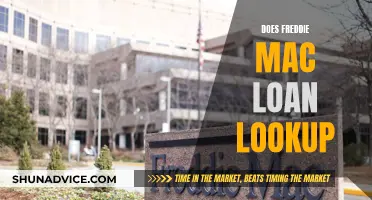
Ginnie Mae, or the Government National Mortgage Association, is a federal government-owned corporation that helps guarantee homes for low- and middle-income borrowers and first-time home buyers. It does not originate or underwrite loans but instead guarantees loans for organizations like the FHA, USDA, and VA. This means that Ginnie Mae covers a part of the lender's losses if a borrower stops making payments. Ginnie Mae plays a huge role in the housing market, with 22 million households having mortgages that Ginnie Mae has guaranteed over the past decade.
| Characteristics | Values |
|---|---|
| Ownership | Owned by the federal government |
| Control | Controlled by HUD |
| Function | Guarantees loans for organizations like FHA, USDA and VA |
| Type of loans | Guarantees mortgages on single-family and multifamily properties |
| Target group | Low- to moderate-income buyers |
| Market | Operates in the secondary mortgage market |
| Type of securities | Packages loans into mortgage-backed securities |
| Safety | Backed by the full faith and credit of the U.S. government |
What You'll Learn

Ginnie Mae's role in the housing market
The Government National Mortgage Association, or Ginnie Mae, is a government-owned corporation that guarantees the timely payment of principal and interest on mortgage-backed securities (MBSs) issued by approved lenders. Ginnie Mae was established in 1968 as part of the U.S. Department of Housing and Urban Development (HUD) to promote affordable homeownership. It is important to note that Ginnie Mae does not create or buy mortgages, but rather guarantees them for single and multifamily homes. This means that if a borrower stops making payments, Ginnie Mae covers a part of the lender's losses.
By having the government back these loans, homeowners can secure lower interest rates, reducing their borrowing costs. Ginnie Mae's efforts primarily benefit those traditionally underserved in the mortgage market, including first-time home buyers and low-income borrowers. Most mortgages securitized as Ginnie Mae MBSs are insured by the Federal Housing Administration (FHA), which offers more flexible guidelines, such as less strict credit score and down payment requirements.
In summary, Ginnie Mae plays a crucial role in the housing market by guaranteeing mortgage-backed securities, making homeownership more accessible and affordable for low-income families and first-time home buyers. Its role as a government-owned corporation provides stability and trust in the housing market, allowing for increased liquidity and protection for taxpayers.
Gabbana's Fashionable Friendship with Melania Trump
You may want to see also

Ginnie Mae's relationship with the Federal Housing Administration (FHA)
The Government National Mortgage Association, or Ginnie Mae, is a government-owned corporation within the Department of Housing and Urban Development (HUD). It was founded in 1968 to expand affordable housing by guaranteeing the timely payment of principal and interest on housing loans (mortgages), thus lowering financing costs such as interest rates for those loans.
Ginnie Mae is similar to Fannie Mae and Freddie Mac, but it is a wholly-owned government corporation, whereas Fannie Mae and Freddie Mac are "government-sponsored enterprises" (GSEs) that are federally chartered but privately owned by shareholders. Ginnie Mae securities are the only mortgage-backed securities (MBS) backed by the "full faith and credit" guaranty of the US federal government.
Ginnie Mae works with several federal agencies, including the Federal Housing Administration (FHA). Most mortgages securitized as Ginnie Mae MBSs are insured by the FHA, which typically insures mortgages for first-time home buyers and low-income borrowers. The FHA's mortgage insurance protects lenders against losses in the event of borrower default. When this happens, the FHA pays a claim to the lender for the unpaid principal balance of the defaulted mortgage.
Ginnie Mae guarantees the timely payment of MBSs that private financial institutions create from home loans insured or guaranteed by federal programs such as the FHA. It provides the infrastructure necessary for issuers to remit payments to MBS investors and collects the guarantee fee it charges issuers.
GEICO Loan Lease Payoff: What You Need to Know
You may want to see also

Ginnie Mae's ownership and operation
Ginnie Mae, also known as the Government National Mortgage Association, is a government-owned corporation. It is owned and operated by the Department of Housing and Urban Development (HUD), a government organization.
Ginnie Mae does not originate or underwrite loans. Instead, it guarantees loans for organizations like the Federal Housing Administration (FHA), the U.S. Department of Agriculture (USDA), and the Department of Veterans Affairs (VA). These organizations have underwriting guidelines for each loan program, and Ginnie Mae guarantees payments for investors, providing liquidity in the mortgage market.
Ginnie Mae's role is to make the housing market strong and sustainable by supporting a liquid, government-backed mortgage market. It does this by offering mortgage-backed securities (MBS) to international investors. These MBS are guaranteed by Ginnie Mae, meaning that investors will receive payment even if borrowers default. Ginnie Mae's MBS portfolio reached $2.56 trillion in March, with new MBS issuances supporting the financing of over 101,000 households, including more than 45,000 first-time homebuyers.
Ginnie Mae is a crucial part of the mortgage market, especially for low-income borrowers and first-time homebuyers. Without its guarantees, it would be much harder to secure affordable housing. Ginnie Mae's work helps ensure that money flows consistently to mortgage programs that many of the nation's veterans and families in rural communities rely on.
Who Really Owns Your Loan? Freddie Mae Loan Ownership Explained
You may want to see also

Ginnie Mae's impact on mortgage-backed securities (MBS)
The Government National Mortgage Association, or Ginnie Mae, is a government-owned corporation within the Department of Housing and Urban Development. Ginnie Mae plays a crucial role in the mortgage market by guaranteeing mortgage-backed securities (MBSs).
Ginnie Mae's primary function is to guarantee the timely payment of principal and interest on MBSs created by private financial institutions from federally insured mortgages. These MBSs are typically backed by mortgages insured or guaranteed by federal programs such as the Federal Housing Administration (FHA), the Department of Veterans Affairs (VA), and the Department of Agriculture's Rural Housing Service (RHS). By providing this guarantee, Ginnie Mae reduces the risk associated with these securities, making them more attractive to investors. This, in turn, increases liquidity in the mortgage market, making it easier for borrowers to obtain mortgages.
The impact of Ginnie Mae on the MBS market is significant. Firstly, Ginnie Mae's guarantee helps to attract investors to the MBS market, increasing the demand for MBSs. This increased demand leads to improved liquidity in the market, making it easier for lenders to sell their mortgages and, ultimately, for borrowers to obtain financing. Secondly, Ginnie Mae's guarantee provides protection to investors in the event of borrower default. In the stress scenario presented by the Congressional Budget Office, Ginnie Mae's guarantee is expected to cover a portion of the lender's losses, reducing the potential impact on the deficit.
Additionally, Ginnie Mae's role in the MBS market extends to its involvement with other government-sponsored enterprises (GSEs) such as Fannie Mae and Freddie Mac. While these enterprises are not directly backed by the government, they are monitored and regulated by the government and are considered to carry an implied government backing. Ginnie Mae's collaboration with these GSEs further enhances the liquidity and stability of the MBS market.
In conclusion, Ginnie Mae's impact on the MBS market is profound. By guaranteeing MBSs, Ginnie Mae increases investor confidence, attracts capital to the market, and enhances liquidity. This, in turn, makes it easier for borrowers to obtain mortgages and promotes home affordability, particularly for low-income families and first-time home buyers. Ginnie Mae's role is, therefore, crucial in supporting the MBS market and promoting access to affordable housing.
Gap Insurance: Understanding Coverage Limits and Loan Gaps
You may want to see also

Ginnie Mae's role in guaranteeing loans
Ginnie Mae, or the Government National Mortgage Association (GNMA), is a government agency that guarantees timely payments on mortgage-backed securities (MBSs). It is a federally owned corporation that helps guarantee homes for low-income borrowers and first-time home buyers. Ginnie Mae does not originate or underwrite loans; instead, it guarantees mortgages on single-family and multifamily properties, making it more affordable for low-income families to secure financing.
Ginnie Mae was created to help Americans access more affordable mortgage loans. It guarantees US government loans, reducing the risk for lenders and investors. This means lenders can offer more appealing rates and more flexible qualifying factors to home buyers. For example, FHA loans are a popular option for many first-time homeowners because of their less strict credit score and down payment requirements.
Ginnie Mae also backs loans made by the US Department of Agriculture (USDA) through its Rural Housing Service (RHS) program. These loans are intended to provide an affordable mortgage option for borrowers interested in purchasing a home in a rural area. To qualify, you must purchase a home in a qualifying rural area, and you and your household can't make more than 115% of the area's median household income.
Ginnie Mae's securitization model guarantees mortgage-backed securities. This means that Ginnie Mae covers a part of the lender's losses if a borrower stops making payments. Ginnie Mae provides the liquidity necessary to support the free flow of capital in the housing market.
Fannie and Freddie: College Loan Options Explored
You may want to see also
Frequently asked questions
Ginnie Mae, officially known as the Government National Mortgage Association, is a federally owned corporation that helps guarantee homes for low- to moderate-income buyers and first-time home buyers.
No, Ginnie Mae does not own your loan. It does not originate or underwrite loans. Instead, it guarantees loans for organizations such as the FHA, USDA and VA.
Ginnie Mae packages loans into mortgage-backed securities that are then traded on the secondary market, providing lenders with the capital to issue new loans. By guaranteeing these securities, Ginnie Mae reduces lender and investor risk.
Ginnie Mae is a government branch and is controlled by HUD, while Fannie Mae is a publicly traded organization. That means shareholders own Fannie Mae, whereas the government owns and runs Ginnie Mae.
Ginnie Mae plays an important role in the affordability of certain loan programs involved with the Federal Housing Administration (FHA), Department of Veterans Affairs (VA), and U.S. Department of Agriculture (USDA). Without Ginnie Mae, these agencies wouldn't be able to offer flexible guidelines, making it much more difficult to find affordable housing.







